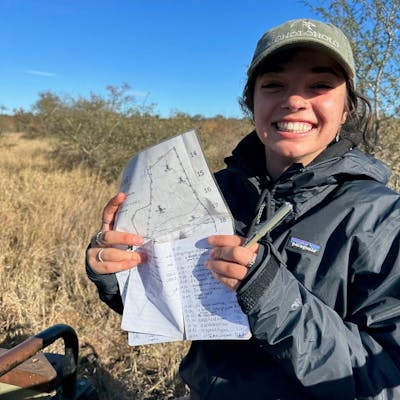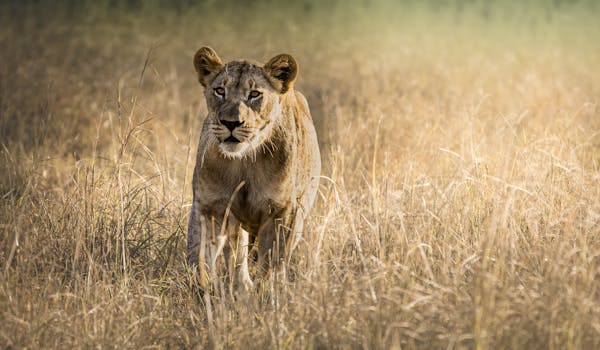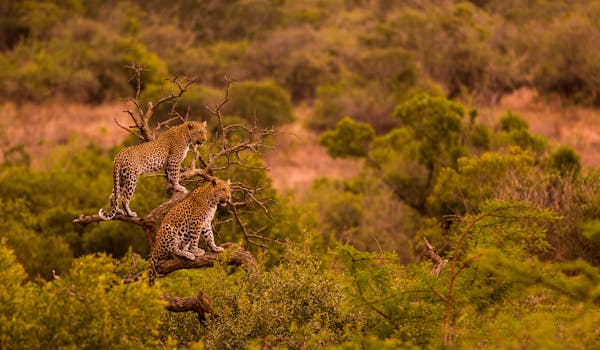Make it yours
Every experience is customised to be just right for you.
WILDLIFE VOLUNTEERING: THE RED FLAGS MOST PEOPLE MISS
Learn more
Make your CV stand out from the herd.
Wildlife research internships in Africa with African Conservation Experience mean going beyond theory, immersing you in hands-on fieldwork and showing how conservation science works in the real world.
Imagine spending your days setting up infrared camera traps to capture new field data on elusive species. Carrying out your own ecological survey while developing skills in animal tracking, spoor identification and telemetry systems. Then returning to base camp for a masterclass in behavioural observations or habitat assessments from a highly qualified field researcher.
Under the guidance of expert field researchers, you’ll develop essential skills in ecological data collection, statistical analysis, research design, and practical conservation fieldwork.


Explore our wildlife research internships in Africa.

Gain practical field research experience, working alongside leading conservation authorities
View details for Umsele Wildlife Research Internship - In Partnership With Balule & EWT
Go behind the scenes on a Big 5 reserve and join one of the biggest conservation success stories
View details for Phinda Wildlife Research Project
Explore a variety of animals in the Okavango Delta, home to the largest elephant population on Earth
View details for Okavango Wilderness ProjectClick the button to access your free guide. We've also sent it to your email.
Inside: the 8 red flags that reveal exploitation, the 10 green flags that prove genuine conservation, and the questions to ask before you book.
Download now
An ACE student monitoring tracks on the Okavango Wilderness Project
Africa is home to some of the most iconic and ecologically significant species on Earth, from lions and elephants to pangolins and wild dogs. But it's also under intense pressure. Human population growth, expanding agriculture, climate change, and poaching have all contributed to fragmented habitats and species decline.
The most common cause of human-wildlife conflict is animals damaging crops and livestock. As herbivores, elephants only eat plants, which is why farmers often take extreme measures to keep elephants away. Meanwhile, the illegal wildlife trade continues to drive poaching. Without reliable data on population numbers, movement patterns and habitat use, wildlife protection efforts become reactive rather than what we want - proactive.
Conservation research internships in Africa are a vital training ground for the next generation of conservationists, ecologists, and wildlife managers. By participating in dedicated wildlife management programs, you contribute directly to long-term data collection and sustainable wildlife management strategies. Whether it's conducting population density surveys or mapping vegetation changes, using drone and satellite data or spoor tracking, your work helps inform real-world conservation decisions.
Field-based wildlife research internships go beyond the academic and into the practical - for instance, you might find yourself setting up camera traps to study the nocturnal behaviour of elusive species, tracking cheetah using telemetry equipment for reserve management, or assisting with a waterhole census. Placed in the middle of working ecosystems, students on conservation research internships learn hands-on with the latest technology and gain a unique perspective on conservation challenges and solutions, contributing to specific research questions and wildlife management decisions. This applied conservation isn't just educational, but also essential, especially in areas where wildlife and human needs are deeply intertwined.
Many universities and future employers place a great deal of value on wildlife management internships. For this reason, we do our best to link up like-minded students on our wildlife internships, so additional learning, discussions and networking can take place around the campfire, not just in the field.
Interns on our wildlife research internships in South Africa and Botswana are mentored by experienced field researchers, expert anti-poaching and tracking specialists, and conservation professionals. Many have spent years on the ground and have relevant qualifications within their areas. Together, you'll explore the delicate equilibrium between people, animals, and the landscapes in which they live. Informal lectures will include topics such as population dynamics, carrying capacity, invasive species management and conservation planning, all in the context of Africa's diverse ecosystems.
As well as preparing graduates of our conservation research internships for the future, we are also focused on contributing in the present. Each intern will be supporting initiatives aligned with the UN Sustainable Development Goals, and we are proud to be affiliated with leading global organisations like WWF and the Endangered Wildlife Trust (EWT), to deliver genuine impact.
Internships focused on conservation research in Africa allow early-career professionals and students to contribute to real-world ecological studies in diverse habitats while working alongside wildlife biologists, ecologists, field researchers, anti-poaching specialists and expert trackers. Volunteering experiences also offer this experience, but those on an internship receive more direct mentorship with conservation professionals, delving deeper into topics and essential field skills to enhance their CVs. For aspiring zoologists, ecologists or conservation scientists, these internships provide career-defining experiences.
You'll be working directly with experienced professionals who are actively engaged in conservation research Africa-wide. These specialists provide the tools, network and guidance to help shape your next steps.
These programs are primarily designed for individuals studying or working in fields such as conservation, biology, ecology, zoology, environmental sciences, or related disciplines. They're also suitable for qualified professionals seeking practical experience in a new environment. Each internship may have specific requirements, so we recommend reviewing the detailed information before enquiring to ensure a good fit.
We only partner with wildlife research projects where animal populations are either near self-sustaining or largely sustainable with minimal human support - a model we refer to as "stewarded". This approach allows animals to live as naturally as possible, which is vital for ensuring high standards of animal welfare and enabling genuine conservation efforts.
For more information on the topic of supporting sustainable wildlife management, please refer to our Wildlife Populations guide.
We specialise in wildlife research internships in southern Africa. From tracking rhinos to conducting behavioural observations of big cats, the internships are based within established wildlife management programs, giving hands-on access to endangered species, protected areas, and critical conservation projects.
There are two standout research programs we work with! The Phinda reserve in South Africa has succeeded not just in reducing conflict but in creating a positive working relationship between wildlife and local communities. And the Okavango Wilderness Project is led by a leading lion ecologist and PhD Wildlife Management Researcher, Dr Christiaan Winterbach.
Yes! At the end of your wildlife conservation internship, you can request a reference letter.
Take the first step on your adventure by simply submitting an enquiry form. We offer ethical conservation internships tailored to your interests, experience level, and career goals. You can even combine multiple programs to create an exciting Combined experience. You can find out more about how we take time to create a customised African Conservation Experience that’s just right for you here.
We can't wait to speak to you about the opportunities to join a conservation research internship!


